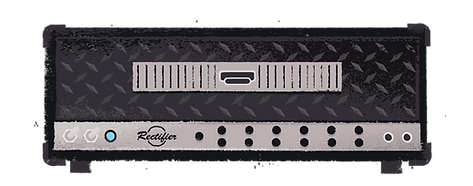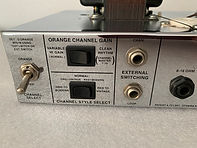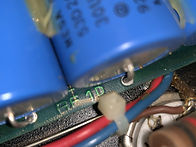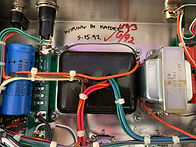


1999
1992
Welcome to the Mesa Boogie Rectifier Guide for the 2 channel Dual & Triple Rectifiers. This site was created to help document the various revisions and changes that occurred from 1992 until late 1999/early 2000 when the three channel Rectifiers were released.
So why all the revisions? Well, Mesa Boogie were never shy about improvement to any of their amplifier circuits (ref: the Mark Series for example), and while internet forums and Facebook Groups love to talk about how different each Revision is, the truth is all of the various Revisions are pretty similar in the Gain channels. The Clean channels experienced the most changes and this would in turn affect the dirty channel to varying degrees.
The initials 'GM' are found on the vast majority of the 2 channel Rectifiers and these initials belong to George Mueller, with MB (Mike Bendinelli) also initialing off the builds.
The information found here is based on years of research and direct conversations with folks at Mesa Boogie. All serial number ranges have been verified by myself and are always being updated as new info is found.
Revision A/B (1989-1991)

Development of the new Rectifier Series began in 1989 and completed in 1991, when Mesa Boogie received the patent for the new amplifier model. Originally intended for the hair metal bands of the 80s, by the time the Rectifier arrived the Seattle-based Grunge movement was in full swing and the musical landscape had changed. These first two revisions were never publicly released and lived as working prototypes.
Note these early prototypes were built into Mark IV chassis and even had the EL34/6L6 selector in the earliest stages. The name Dual Rectifier comes from the 2 types of power rectification available on the amp, allowing for sagged-out vintage feel (tube rectification) or modern tightness and faster response (silicone diodes).
Revision C (1992)
Serials: 0001-0261 (approx)
Output Trans: 562100
562181 (export)
Power Trans: 561136
561137 (export)
Power Tubes: STR-420 6L6
Preamp Tubes: Mesa 7025 (Chinese)

The Mesa Boogie Dual Rectifier made its debut in February 1992 costing $1195, with the Chrome chassis option being an additional $100. Small Mesa logo badge and headshells came covered in leather or rhino (not tolex).
Rev C can best be described as aggressive, with a pronounced upper-mid 'grunt'. The clean channel was......well, not clean at all. This was because the Rev C clean circuit bypassed the 1st gain stage, resulting in a weak and noisy clean channel. To be useable, the Channel Master Volume needed to be quite high, which is also noted on the rear panel next to the Orange Channel Mode Select switch, 'Channel Master 7-10'. More on this part later.
Dokken's George Lynch toured with (2) Rev C's in the early to mid 90's and it was an interview of his that was the first documented account of any mention of Rectifier revisions and used to insist that the first 500 amps or so had unique and special transformers and would pull Rectifier chassis' out of their shells to check which was under the hood.





George Lynch's Rev C
Rev C Internals
R-0001
Channel Master 7-10
Revision D (1992)
Serials: 0262-0503 (approx)
Output Trans: 562100
562181 (export)
Power Trans: 561136
561137 (export)
Power Tubes: STR-420 6L6
Preamp Tubes: Mesa 7025 (Chinese)

Revision D can be described as a very close sonic sibling to Rev C, but maybe a bit darker while still being quite aggressive with lots of gain and saturation on tap. Sonically this Revision doesn't have the massive bottom end the later circuits do, and is decidedly more '80's' sounding to my ear.
Like Rev C, there is a Serial FX Loop (indicated by a single FX Loop Level knob). Output Trans and Power Trans are also still sourced from the Mesa Mark III amplifier, made by Schumacher. Small Mesa logo badge and leather or rhino headshell covering. Made until August 1992.





Original 1992 Ad
Revision E (1992)
Serials: 0525-0617 (approx)
Output Trans: 562100
562181 (export)
Power Trans: 561136
561137 (export)
Power Tubes: STR-420 6L6
Preamp Tubes: Mesa 7025 (Chinese)

Revision E has the distinction of the shortest run of all of the revisions, at just over 100 amps produced. This makes it the rarest of the revisions and the least documented.
Rev E can be described as a bit brighter then other Revisions but having a good amount of midrange and aggression. The vast majority of Rev E amps are of the classic black chassis/chrome treadplate config, with 3 or 4 amps being documented as having factory chrome chassis/black treadplate. Small Mesa logo badge and leather or rhino headshell covering. Last documented Rev E was built September of 1992.




Rev E Internal Wiring
Rev E Internals
Manual Top Page
Revision F (1992-1994)
Serials: 0643-3180
Output Trans: 562100 (early)
562105 (later)
Power Trans: 561136 (early)
561140 (later)
Power Tubes: STR-420 6L6
Preamp Tubes: Mesa 7025 (Chinese)

Revision F was a big change for the Rectifier circuit. The clean channel now used one side (or half) of each preamp tube position to create its Clean Channel, which brought with it improved dynamics, clarity and less grit.
Rev F also saw the introduction of the all-new Triple Rectifier, the 150 watt behemoth that was so named not because it had three rectification modes but simply because it was a more powerful version of the 100 watt Dual Rectifier. Additionally, a rackmount version of the Dual Rectifier was now available for 1993 and came in black on black color config but could have a Chrome chassis for an additional $100. The earliest Rackmount Rev F I have found is #829.
The earlier Mark III Output and Power transformers were also phased out around serial 1300-1500 in favor of the 562105 Output and 561140 Power Transformers that would be carried over into the Rev G amplifiers. This circuit is very close to a Rev G but with a different value Presence pot and a few other component values. Late in the Rev F run (approx. #3000) you also see the introduction of the Parallel FX Loop.
Sonically, the Rev F has a throaty low mid grunt along with a much tighter low end response that metal players find especially useful. Sounds almost boosted plugged straight into the amp.
Mid way into the Rev F run, the Tremoverb makes its first appearance in April of 1993 at approx SN 1737 (they have their own circuit board revisions).



1993 Rackmount

Ref F Triple Recto


Rev F Chassis
Revision G (1994-2000)
Serials: 3181-16480 (approx)
Output Trans: 562105
Power Trans: 561140
Power Tubes: STR-420 6L6
Preamp Tubes: Mesa 7025 (Chinese)

Revision G is the classic Rectifier sound that most of us think of when referencing the Rectifier Series: big, robust low end with loads of gain and volume to back it up. Used by a wide variety of artists such has Rollins Band, Sublime, Soundgarden, 311, Jeff Buckley, Foo Fighters and No Use For A Name, the Revision G began life with a small logo before transitioning to a large Mesa badge, about a thousand amps into the run. Also featuring a Parallel FX Loop, tolex covered headshell and beginning in 1997 a detachable power cord.
By the time 1994 rolled around, you could not turn on the radio at any time of day without hearing this amplifier for the rest of the decade. As Nu-Metal came into popularity in the late 90's, the Rev G was embraced by Linkin Park, Disturbed, Limp Bizkit, Creed and many more.
By 1998 the Rectifier product line now includes the Single, Dual & Triple Rectifiers, Rackmount ("Racto") model, Tremoverb, Rectoverb & Maverick variants. Production ceased in mid-late March of 2000.





Early Rev G
1995 Catalog
Korn's Rectifiers
The Anomalies
Revision C (1992)
150W Dual Rectifier Prototype
Serial: R-0217
Output Trans: 562100 (Mark III)
Power Trans: 562180 (Mark III Coli)
Power Tubes: STR-420 6L6
Preamp Tubes: Mesa 7025 (Chinese)

In the earliest of the Dual Rectifier days, Mesa Boogie, and more specifically Mike Bendinelli was already thinking about a higher powered Rectifier with additional headroom. Sort of like what the Mark III Coliseum amplifier was to the Mark III Series.
This is a verified, 150 watt Dual Rectifier prototype. Hardwired by Mike B in the Silicone Diode mode, the 2 Rectifier tube sockets use an additional pair of 6L6s to effectively become a Triple Rectifier prototype, Revision C.
Interestingly, this amplifier has a Mark III Coliseum Power Trans to accommodate the 150 watts along with the 562100 Mark III Output Trans the other early Revisions had at that time.
Special thanks to owner Dennis Kauffman for the information and photos.




Revision G Early Config (1994)
Serials: 3200-5000 (approx)
Output Trans: 562100 (early)
562105 (later)
Power Trans: 561136 (early)
561140 (later)
Power Tubes: STR-420 6L6
Preamp Tubes: Mesa 7025 (Chinese)

Starting at approx #3200 or so, there were an unknown number of oddly configured Rectifiers. If I had to make a guess I would say maybe a few dozen amps, possibly more. These amplifiers had Rev G circuit boards, with Chrome chassis and mostly Serial (very few were parallel) loops, small Mesa logo badge and the early 562100 & 561136 transformers.
There are a few likely reasons for these amplifiers including a dealer wanting a Serial Loop and Mesa simply having some old chrome Rev C chassises on the shelf. The Rev G chassis is drilled for a (2) knob FX Loop so grabbing a 3 year old Chrome chassis would have made life easy. How do we know these are in fact early chassises and not newer chromed ones? Remember in Rev C there was a note to have the Clean Channel Master at 7-10? These have that notation as well.
I want to stress in this serial number range, anything seemed to go. You will find Rev G amplifiers with small logo, attached power cord and newer Rev G transformers, and you will also find Rev G amps with older Mark III trannys, large Mesa badge and tolex headshell but all of these amplifiers seem to have the early Chrome chassis with both Serial and Parallel FX Loops.

Rev G, Early Config

Rev G, Early Config

Master 7-10